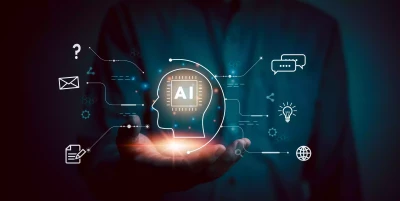Artificial Intelligence 101: insights from a transport tech expert
November 7, 2023
 The transportation industry is on the cusp of a transformative era, driven by the rapid advancement of technology. One of the most exciting developments in this field is the integration of artificial intelligence (AI). AI has the potential to streamline operations, enhance efficiency, and reduce costs for companies across the supply chain. On the other hand, some fear that AI could have a negative impact on the employment prospects of human workers as technology evolves to replace some jobs. Let’s explore how AI is poised to impact the transportation and logistics sector from the point of view of one of the field’s leading experts.
The transportation industry is on the cusp of a transformative era, driven by the rapid advancement of technology. One of the most exciting developments in this field is the integration of artificial intelligence (AI). AI has the potential to streamline operations, enhance efficiency, and reduce costs for companies across the supply chain. On the other hand, some fear that AI could have a negative impact on the employment prospects of human workers as technology evolves to replace some jobs. Let’s explore how AI is poised to impact the transportation and logistics sector from the point of view of one of the field’s leading experts.
Keith Moore, the CEO of Auto Scheduler AI, is a seasoned veteran in the world of transport tech. Moore started his journey as a mechanical engineer who transitioned into product management, specializing in data acquisition. While working with companies like Qualcomm, Intel, and SpaceX, Moore recognized the need for better data handling methods. This realization led him into the emerging field of machine learning and AI, eventually joining a startup called Spark Cognition, which focused on bringing AI to various industries. Today, he serves as CEO of the warehouse resource planning and optimization platform Autoscheduler.AI.
What exactly is modern artificial intelligence, and what are its implications in the transport industry? Learn more in the latest episode of the Stay In Your Lane Podcast.
To understand the role of AI in the transportation and logistics industry, it is important to understand the evolution of AI over the past decade. AI aims to replicate human behavior and decision-making in non-human entities.
“A lot of it is really just mathematics,” Moore explains. “Even the really cool, modern AI like Chat GPT and Midjourney with generative modelling, it’s all mathematics under the hood.”
While the concept of AI has been around for decades, several technological advancements have accelerated its growth. These include:
- Computing Power: Computers have become more powerful and cost-effective, enabling complex AI algorithms to run efficiently.
- Software Revolution: The early 2000s marked the rise of software, which significantly contributed to the adoption of AI.
- Cloud Computing: The advent of cloud computing allowed for remote data storage and processing, making it easier to collect and analyze vast amounts of data.
- IoT (Internet of Things): The IoT movement expanded the collection of usable data by adding sensors to various objects and devices.
The rise of AI comes largely down to the proliferation of data. “There’s all this data now that you can start to collect, so the evolution becomes what to do with it,” says Moore. “What decisions do you make off of it, and how do we use all of this to our advantage to make better decisions?”
AI is categorized into two main types: narrow AI and artificial general intelligence (AGI). Narrow AI is designed to excel in specific tasks, such as customer support chatbots.
“Narrow AI is artificial intelligence applications that are good at doing one thing really well,” Moore explains. “This is a very proven business case that you can build whole businesses around.”
One of the exciting developments in narrow AI is generative modeling, which allows AI systems to not only predict and prescribe but also create new content. This advancement is especially prevalent in chatbot technologies like Chat GPT, where AI systems can generate responses and content.
Keith Moore’s insights offer a valuable perspective on the evolving role of AI in transportation and logistics. As AI continues to advance, it promises to revolutionize the industry, providing opportunities for improved efficiency, cost reduction, and better decision-making. Join us next week for part two of this series as we explore AI’s impact on the employment landscape and its transformative potential in the world of transportation and logistics.














